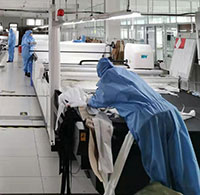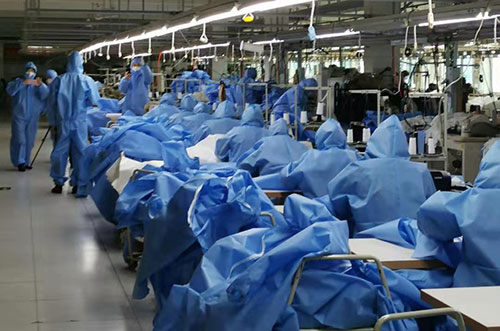"Even before COVID-19 stuck China, many fashion businesses were shifting their production to countries like Vietnam, Cambodia and Bangladesh. However, these countries rely heavily on China for raw materials and other unfinished goods and services. Once their stock imported from China is depleted, they may face the brunt of the supply disruption. As per United Nations Conference on Trade and Development in March, about 20 per cent of global trade in manufacturing intermediate products originated in China."
 Even before COVID-19 stuck China, many fashion businesses were shifting their production to countries like Vietnam, Cambodia and Bangladesh. However, these countries rely heavily on China for raw materials and other unfinished goods and services. Once their stock imported from China is depleted, they may face the brunt of the supply disruption. As per United Nations Conference on Trade and Development in March, about 20 per cent of global trade in manufacturing intermediate products originated in China. European Union and Vietnam are expected to be the worst hit by the disruption in inputs for textile and apparel products.
Even before COVID-19 stuck China, many fashion businesses were shifting their production to countries like Vietnam, Cambodia and Bangladesh. However, these countries rely heavily on China for raw materials and other unfinished goods and services. Once their stock imported from China is depleted, they may face the brunt of the supply disruption. As per United Nations Conference on Trade and Development in March, about 20 per cent of global trade in manufacturing intermediate products originated in China. European Union and Vietnam are expected to be the worst hit by the disruption in inputs for textile and apparel products.
Vietnam imports about 55 to 60 per cent of its garment raw materials from China. The country is a base for companies like the Hong Kong-listed Lever Style Corp, which manufactures for brands including Paul Smith and Hugo Boss. Although its factories are yet to experience any meaningful delays, it has not being able to find supply alternatives beyond China.
Similarly, Uniqlo-owner Fast Retailing Co is also exposed to the outbreak as over half of its sewing factories and fabric mills are located in China and a quarter in Southeast Asia. Many of these sewing factories could face a serious shortfall of raw materials from April if shipments do not resume in March.
fabric mills are located in China and a quarter in Southeast Asia. Many of these sewing factories could face a serious shortfall of raw materials from April if shipments do not resume in March.
China to remain the preferred supplier
The situation highlights the challenges that manufacturers face in diversifying their supply chains. Unlike their Southeast Asian counterparts, South Asian countries such as India and Bangladesh have the entire value chain of textile products within their country. Therefore, in near future though apparel manufacturers may look at these countries for their supplies, China may still remain their preferred supplier once it recovers from the outbreak.
Trade policies to influence decisions
Their decisions may also be influenced by the current trade policies which have disadvantaged several local mills. The country has trade deals with countries like Indonesia and Vietnam while it lacks free trade deals with the European Union, Canada and Australia.
The spread of Coronavirus to Europe and other parts of the world is also likely to be a threat to bigger players such as Industria de Diseño Textil SA and H & M Hennes & Mauritz AB (publ). However, the two companies are relatively lesser exposed to manufacturing shutdowns in China as less than a third of their manufacturing facilities are located in the country. H&M also does not anticipate the coronavirus to delay to its supplies. The Swedish company has temporarily closed 41 of its more than 500 stores in China.












